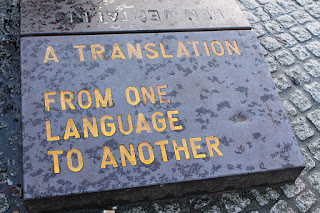As professional translators, we need to keep abreast of the
latest information relating to not only our profession, but to our area(s) of
expertise as well. There are many ways you can do this – being actively
involved in translators associations is one way; attending conferences,
workshops, seminars, etc. is also a vital component in honing your skills. However, you can also keep yourself au courant on a day-to-day basis using social media.
A mere 10 years ago, Twitter was just a weird platform where teenagers wrote
140-character sentences to each other and no one really knew why, but now
Twitter is a major source of information where an almost infinite amount of content is blasted
out constantly, and where virtually every industry has a presence. What’s nice about
this is that it is now very easy to stay informed of the latest news in both the world of translation and within your specialist area.
1. IFRS Foundation
#IFRS Did you miss our live web presentation on the new Leases Standard #IFRS16 last week? It's still available here https://t.co/VPTSQLyl0T
— IFRS Foundation (@IFRSFoundation) January 20, 2016
The IFRS Foundation/IASB tweets about changes to IFRS (International Financial Reporting Standards) and publishes presentations and videos explaining new standards or amendments. This is a great resource if you translate the Annual Reports of companies that use IFRS.2. IFRS Demystified
— IFRS Demystified (@Ifrsdemystified) January 21, 2016
IFRS Demystified posts about changes to IFRS regulations and the impacts that those regulations have on businesses around the globe.3. Autorité des Marchés Financiers (AMF)
[Etude]Placements atypiques, trading en ligne, arnaques: découvrez l'étude de @institutCSA > https://t.co/KYbhovUWcq pic.twitter.com/37kVSKHmDq
— AMF (@AMF_actu) January 27, 2016
This is the official Twitter account of the the Autorité des Marchés Financiers. They post news and information about French financial markets. This is a great resource for FR<>EN financial translators.4. The International Auditing and Assurance Standards Board (IAASB)
MT @BakerTillyInt IAASB publishes final amendments for auditor reporting standards on financial statements https://t.co/Yuhpdg4vbE
— IAASB (@IAASB_News) January 23, 2016
The International Auditing and Assurance Standards Board (IAASB) tweets about international auditing, audit reporting, financial reporting, new accounting standards, etc.5. Francesca Airaghi
Financial Times Lexicon - The definitive dictionary of economic, financial and business terms https://t.co/5hJCAZymSl
— Francesca Airaghi (@FranAiraghi) December 23, 2015
Francesca Airaghi is an English to Italian financial translator who tweets about financial translation, accounting/finance/global markets, freelancing and general topics for freelancers. She's the only individual I have on this list, but her Twitter activity is practically tailor-made for financial translators and is definitely worth a follow.6. The Federation of European Accountants (FEE)
FEE issues new briefing paper on the impact of Europe's audit #reform on #audit committees https://t.co/qIVASQhqFb pic.twitter.com/pRQ80QuIlI
— FEE (@FEE_Brussels) January 19, 2016
The Federation of European Accountants is an active organization that issues opinions on new European accounting standards. This is a good account to follow if you want to know how experts in the field are reacting to new and/or amended accounting standards and practices.7. The International Federation of Accountants
#Integratedreporting continues to grow momentum. Read what experts are discussing on the Global Knowledge Gateway https://t.co/ARGOHKdzVD
— IFAC (@IFAC_Update) February 1, 2016
The International Federation of Accountants tweets about audit standards, ethics, the integrated reporting movement and other accounting topics.8. Accountancy Live
IAS 7 amend to improve disclosure #financing liabilities - raises costs for preparers #accounting https://t.co/6sO85LD3vm @accountancylive
— accountancy live (@accountancylive) January 29, 2016
Accountancy live tweets news about taxes, accounting and audit for mostly the EU, but posts some US news as well. This Twitter account is a good source for industry news.9. World Economics
— World Economics (@WorldEconomics) January 31, 2016
World Economics posts about employment, global trends for many different industries, and other topics and news related to global economics.10. The FAF, FASB and GASB
#FASB issues proposed improvements to financial reporting of #pensions and other postretirement benefit plans #opeb https://t.co/e5ZqtrSM5y
— FAF, FASB, and GASB (@FAFNorwalk) January 26, 2016
The FAF (Financial Accounting Foundation), the FASB (Financial Accounting Standards Board) and the GASB (Governmental Accounting Standards Board) tweet under one handle (@FAFNorwalk). This is the go-to place for information regarding GAAP, as these organizations set financial reporting standards and accounting standards for organizations that use GAAP for their accounting.11. Accountancy Age
FRC: Extended auditor reporting welcomed by investors: https://t.co/aSkvivyUZH pic.twitter.com/jl9J687LCJ
— Accountancy Age (@AccountancyAge) January 29, 2016
Accountancy Age tweets about accounting news and analysis for mostly the UK, but they also post some articles about the rest of Europe and the US as well.12. Investopedia
The #gdp for the top six economies didn't do so well in the fourth quarter https://t.co/OKO0Jm78r6
— Investopedia (@Investopedia) January 29, 2016
I'm sure every financial translator who translates into or out of English has looked up a term on Investopedia at least once, so it shouldn't be a surprise that it is included in this list. Investopedia posts news articles about the economic/financial situation of countries and companies across the globe.
13. Compliance Week
— Compliance Week (@complianceweek) January 27, 2016
Compliance Week tweets about all things compliance-related. Internal controls, risk management, accounting compliance/audits, etc. This Twitter account is a personal favorite of mine because I was a trade compliance manager before becoming a full-time translator. However, my personal background aside, this is still a useful resource since compliance and internal control are such integral components of corporate reporting.14. Funded News
This NYC Startup Just Raised $9.5M To Do This For Hotels: ALICE, has just raised a $9.5M, wi... https://t.co/Kc44eSWWmv #funded #startups
— Funded News (@FundedNews) January 21, 2016
Funded News is pretty self-explanatory. They tweet about start-ups that have just acquired funding. If you want to do some digging and research to hunt for direct clients, this could be a good resource, as it can help you figure out which start-ups are ready for international expansion (and thus 15. International Monetary Fund (IMF)
Historic IMF quota and governance reforms go into effect: https://t.co/dhvjn7pSKp
— IMF (@IMFNews) January 27, 2016
Last, but certainly not least, is the International Monetary Fund. This Twitter account is a great go-to source of information on the global economies and information on efforts being made by the IMF to promote sustainable economic growth around the world.Final Thoughts
This is not an exhaustive list - just some of my favorites that are very active on Twitter. If you would like to see all of the accounting/finance Twitter accounts that I follow, I keep them in a separate list here. Do you have any favorites that are not on this list? If so, let me know!




